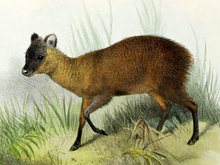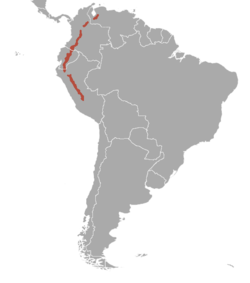Northern pudu
Species of small South American deer From Wikipedia, the free encyclopedia
The northern pudu (Pudella mephistophiles, Mapudungun püdü or püdu,[4] Spanish: pudú, Spanish pronunciation: [puˈðu]) is a species of South American deer native to the Andes of Colombia, Venezuela, Peru and Ecuador. It is the world's smallest deer[5] and is classified as Data Deficient in the IUCN Red List.[1] Originally classified under genus Pudu, some authorities consider it to belong to a separate genus (Pudella) from the southern pudu, along with Pudella carlae.[6]
You can help expand this article with text translated from the corresponding article in German. (August 2024) Click [show] for important translation instructions.
|
| Northern pudu | |
|---|---|
 | |
| Northern pudu (P. mephistophiles) | |
| Scientific classification | |
| Domain: | Eukaryota |
| Kingdom: | Animalia |
| Phylum: | Chordata |
| Class: | Mammalia |
| Order: | Artiodactyla |
| Family: | Cervidae |
| Subfamily: | Capreolinae |
| Genus: | Pudella |
| Species: | P. mephistophiles |
| Binomial name | |
| Pudella mephistophiles (de Winton, 1896) | |
 | |
| Geographic range of Pudu mephistophiles | |
| Synonyms | |
|
Pudua mephistophiles de Winton, 1896[3] | |
Description
The northern pudu is the smallest species of deer in the world, standing 32 to 35 cm (13 to 14 in) tall at the shoulder and weighing 3.3 to 6 kg (7.3 to 13.2 lb).[7] The antlers of the northern pudu grow to about 6 cm (2.4 in) long and curve backward. Its coat tends to be lighter than that of the southern pudu, but the face is darker compared to the coat.[7]
Range and habitat
The northern pudu is found at higher altitudes than its sister species, from 2,000 to 4,000 m (6,600 to 13,100 ft) above sea level. It has a discontinuous range across the Andes of Colombia, Ecuador, and Peru. It inhabits montane forests, high-elevation elfin forests, and humid alpine páramo grasslands above the tree-line. The Marañón dry forests are a gap in the species' range, separating the Ecuadorian population from the Peruvian population in the Peruvian Yungas south of the Marañón River.[1]
References
Wikiwand - on
Seamless Wikipedia browsing. On steroids.

